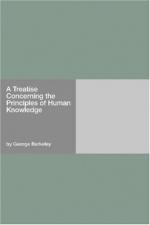17. Advantage of investigating the doctrine of abstract general ideas.— It were an endless as well as an useless thing to trace the Schoolmen, those great masters of abstraction, through all the manifold inextricable labyrinths of error and dispute which their doctrine of abstract natures and notions seems to have led them into. What bickerings and controversies, and what a learned dust have been raised about those matters, and what mighty advantage has been from thence derived to mankind, are things at this day too clearly known to need being insisted on. And it had been well if the ill effects of that doctrine were confined to those only who make the most avowed profession of it. When men consider the great pains, industry, and parts that have for so many ages been laid out on the cultivation and advancement of the sciences, and that notwithstanding all this the far greater part of them remains full of darkness and uncertainty, and disputes that are like never to have an end, and even those that are thought to be supported by the most clear and cogent demonstrations contain in them paradoxes which are perfectly irreconcilable to the understandings of men, and that, taking all together, a very small portion of them does supply any real benefit to mankind, otherwise than by being an innocent diversion and amusement—I say the consideration of all this is apt to throw them into a despondency and perfect contempt of all study. But this may perhaps cease upon a view of the false principles that have obtained in the world, amongst all which there is none, methinks, has a more wide and extended sway over the thoughts of speculative men than [Note.] this of abstract general ideas.
[Note: “That we have been endeavouring to overthrow.”—Edit 1710.]
18. I come now to consider the source of this prevailing notion, and that seems to me to be language. And surely nothing of less extent than reason itself could have been the source of an opinion so universally received. The truth of this appears as from other reasons so also from the plain confession of the ablest patrons of abstract ideas, who acknowledge that they are made in order to naming; from which it is a clear consequence that if there had been no such things as speech or universal signs there never had been any thought of abstraction. See iii. vi. 39, and elsewhere of the Essay on Human Understanding. Let us examine the manner wherein words have contributed to the origin of that mistake.—First [Vide sect. xix.] then, it is thought that every name has, or ought to have, one only precise and settled signification, which inclines men to think there are certain abstract, determinate ideas that constitute the true and only immediate signification of each general name; and that it is by the mediation of these abstract




